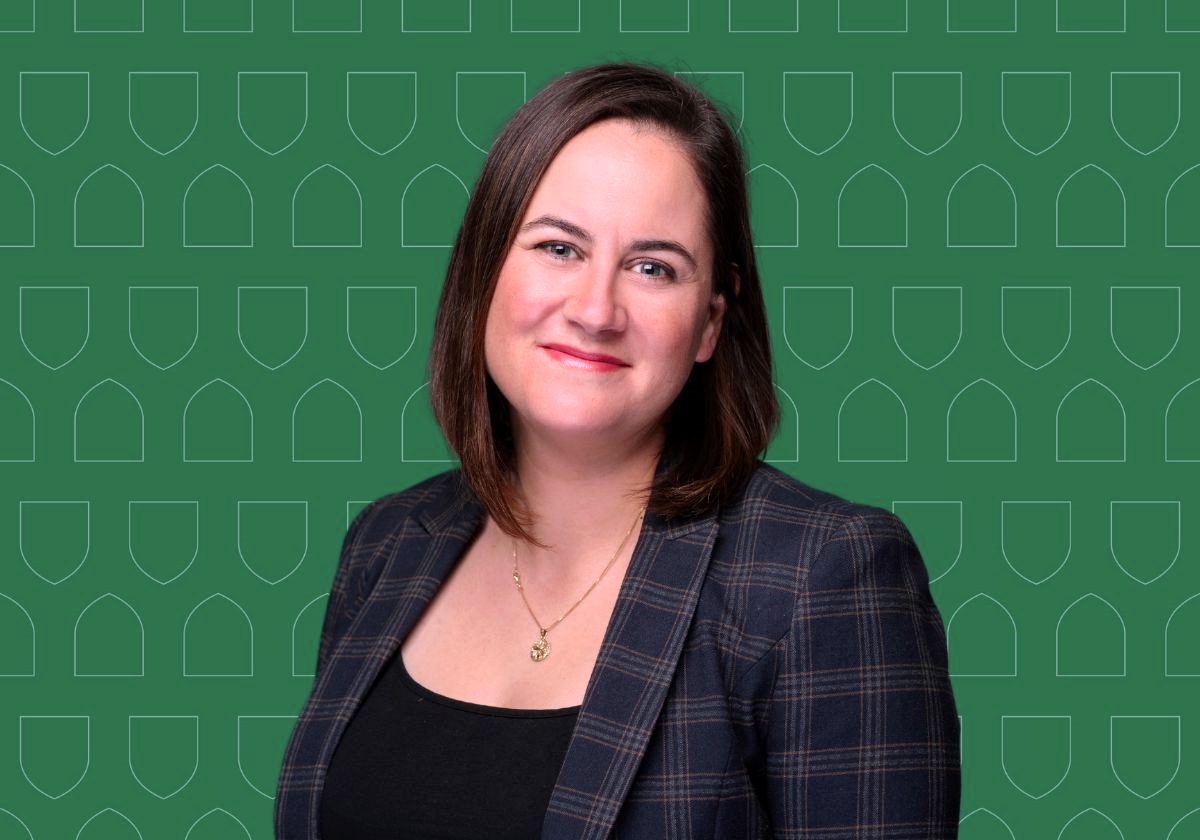
Faculty Member Celebrates Completion of PhD
PhD graduate Dr. Anne Hyde celebrates a solid foundation in nursing and teaching.
All set to graduate this week with her Doctor of Philosophy in Nursing (PhD) from the University of Saskatchewan (USask) College of Nursing, Dr. Anne Hyde (PhD) (BSC’ 01, BSN’04, MN-NP’08, PhD’25) is both a practitioner and an academic.
She is interested in pushing the overall nursing profession forward, while also embracing the ability to make a difference at the bedside.
Hyde credits USask College of Nursing with helping her to do all this and more.
“I've certainly felt the college has always supported me to continue to the next phase of my nursing journey”, said Hyde.
“That is something I think is really special.”
Knowing she wanted to work in health care, but unsure of her pathway, Hyde had already completed a bachelor’s degree in Microbiology before applying to nursing. She was admitted through the Nursing Education Program of Saskatchewan.
“It was a great decision,” she said.
“Nursing has really aligned well with who I am and how I like to interact with my patients, in that very relational kind of way.”
As a nursing student, Hyde thought she would go into pediatrics, but instead gravitated to cardiology and medicine, working in an intensive care unit (ICU), when she became a registered nurse (RN).
“I really liked the focus on one patient and the ability to interact closely with the patient's families,” said Hyde. “Also, the complexity of care in the ICU.”
After working for a while, she applied to the University of Saskatchewan Nurse Practitioner program. Upon graduation, she went on to work in primary care in both small urban and rural areas and ended up working as a nurse practitioner (NP) with a geriatrics program in Saskatoon.
“It turns out the population I really like to work with is geriatrics, instead of pediatrics - the other end of the spectrum,” she said with a smile.
“I like the geriatric patient population and in general, just talking with my patients. From a medical perspective, they are really interesting, as there is often a lot of complexity, so you need to think about the whole person, their home, their community, and supports, as that really forms who they are as a person and the care they require.”
When she applied to do her PhD, Hyde knew she wanted to both boost her research skills and fill in gaps in her knowledge of older adult health.
Supervised by College of Nursing Assistant Professor Dr. Mary Ellen Labrecque (PhD) and Dr. Michael Szafron (PhD), professor with USask School of Public Health, Hyde wrote a doctoral dissertation titled, “Canadian Rural and Urban Older Adults: A Comparison of Functional Status.”
Using the Canadian Longitudinal Study on Aging's data set to look at what factors might shape the health of rural and urban older adults, she found that both sets of adults are affected by age, gender, socio-economic status, and self-rated health.
Finding no difference between the two populations led her to realize the difference may lie in the level of service available to each.
“What my research tells me is that perhaps we need to think about how we serve these populations differently,” said Hyde.
“When their needs are the same, the things that affect them are the same, but we know things like health care service, for example, or the demographics in rural and urban areas are very different, we need to think about how we can meet those needs in the two different contexts.”
Hyde also began teaching as she completed her PhD, most recently taking on a limited-term lecturer role with USask Nursing to teach in the Master of Nursing Nurse Practitioner program.
As a lecturer, Hyde says she enjoys interacting with students.
“It's exciting to meet people who are going to carry the NP role forward,” said Hyde.
“You can see what some of our former students have done with advocating for the NP role in Saskatchewan and that's really exciting. It’s particularly rewarding to be with students as they move from RN to NP and see the possibilities of the advanced nursing education.”
Hyde aspires to stay both teaching and in nursing practice. She continues to work in primary care in a small, rural area. She’s also furthering her research, into older adults and into ways to improve nurse practitioner teaching.
She’s currently working on a project related to the scholarship of teaching and learning with USask College of Nursing NP Program Lead and Associate Professor Academic Programming Janet Luimes, looking at factors that influence the effectiveness of computer-based simulation for NP students. The project is funded by a Spark grant from the Ron and Jane Graham Sport Science and Health Centre at the University of Saskatchewan.
Well into her journey both as a nurse and academic, Hyde says she’s learned a lot along the way.
“When I went into nursing, I didn't actually understand what a nurse was,” said Hyde.
“You really do need a solid foundation in understanding medical conditions, medications, and labs, but you also have to be able to care for your patient on that person-to-person level.”
Thinking about it now, that realization has made her even prouder to be part of the profession.
“That relationship between the patient and the nurse, that's where nursing happens,” adds Hyde.
“The way patients speak to nurses, the things they tell them, the questions they ask, they're different than the way or the things they ask other health care providers. There's a trust and a comfort between patients and nurses. I think nurses are so important for our health care system. We really do play a role that nobody else does.”
Together, we will undertake the research the world needs. We invite you to join by supporting critical research at USask.

